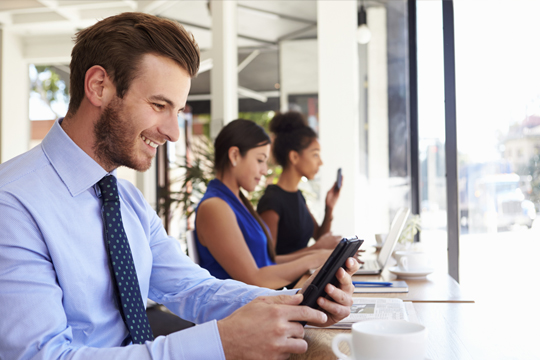First it was pagers, then cellphones, then along came the worldwide web, smartphones, and social media. Before you knew it, you were always connected. Although taking calls after-hours, checking email on weekends, updating your LinkedIn status or browsing Facebook late at night and working vacations may impress your boss, 24/7 connectivity can take its toll – both
mentally and physically.

What is social media?
Social media is defined as websites and applications that facilitate content creation and sharing among users through personal words and messages, images, video and audio; the sharing and exchange of data is referred to as social networking. Today, Facebook, LinkedIn and Twitter are among the most popular social networking sites. In 2012, about 20% of time spent on personal computers and 30% of time spent on mobile devices was dedicated to social networking. For the most part, being connected is a good thing. For example, social media allows you to stay in touch and let your loved ones know they're on your mind, when live conversations are not possible. This can strengthen your relationships, boost your resiliency and help overcome otherwise stressful situations. It's also important to understand the potential negative effects of social media so that you can mitigate them; after all, the key to managing social media is balance.
The negative effects of social media
The first days of what we now call social networking date back to the late 1990’s when instant chat messaging programs were being used; you may recall the messenger programs of ICQ, AOL and MSN. This early technology changed the way we communicated with each other. Today, we spend over three hours every day social networking, with women spending 40% more time daily using social media then men; clearly, social media plays a large and important role in the lives of many people. So, what’s the problem? There are several articles and posts that suggest social media can be bad for your health. One common argument is that social media satisfies a desire to be "liked" by others, and that this recognition comes at a cost. Though getting "likes" may result in a boost of self-confidence, the line between our authentic selves and our online personas can become blurred. Hence, many question if a "like" is psychologically satisfying or emotionally healthy. It is important to understand the consequences of blurring the lines between online and offline personas.
Other potential negative effects of social media can include:
- Anxiety about having real conversations
- Reduced productivity due to multitasking (and the stress that comes along with it)
- Information overload and a tendency to accumulate more information rather than simply relaxing
- A fear of missing out
- Anxiety about being alone with your thoughts
The positive effects of social media
Social media can also be empowering, as we can find answers quickly, make new contacts, and get support from people who understand exactly what we're going through. For example, if you're struggling to lose weight, you can quickly find a community of kindred spirits who have already been there or who currently share your struggles.
Sharing stories of our struggles online can empower us in many ways, including:
- Helping us become more resilient
- Building awareness
- Removing stigma
- Understanding the recovery process
- Recognizing risk
- Finding or becoming role models
- Helping us feel as though we are not alone
- Fostering a sense of belonging
A blog is a website containing a writer's or group of writers' own experiences, observations, opinions, etc., and often having images and links to other websites. Blogging has become the new age journal – many individuals with mental illnesses use social media as an outlet. For example, Natasha Tracy shares her experiences, thoughts, and research on her mental illness and has a loyal following of over 30,000 Twitter followers and thousands of Facebook likes. She regularly receives comments from followers who share their own experiences, say that they can relate to what she's written, and thank her for fighting stigma, educating others and being a voice for those suffering from mental illness. Her stories are changing other peoples' lives for the better, and her social media sites serve as a shining example of social media's positive effects and potential.




